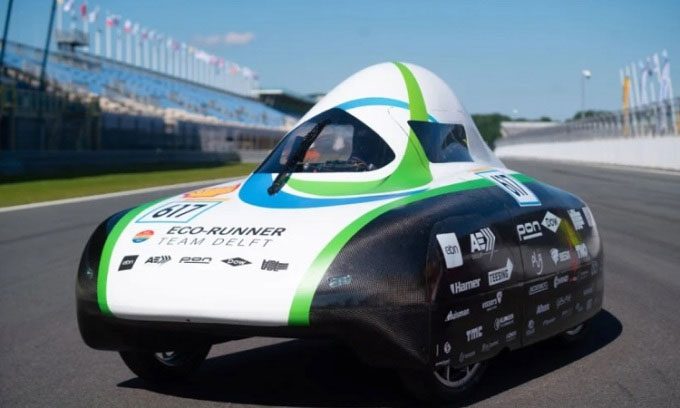The hydro-powered Eco-Runner XIII from TU Delft University achieves 2,488.45 km/l with just one hydrogen fuel tank.
A student team from TU Delft University unveiled their latest prototype, the Eco-Runner XIII, of the hydrogen-powered Eco-Runner compact car in May 2023. The vehicle set a Guinness World Record for distance traveled just a month later, as reported by New Atlas on July 3. The Eco-Runner is designed to be over 100 times more fuel-efficient than modern vehicles running on fossil fuels.

The student team at Delft University of Technology continues to refine the design of the Eco-Runner XIII. (Photo: Design Boom)
The development team selected the Immendingen test track in Germany to set the record. Testing took place on June 22. The following day, starting at 4 a.m., the vehicle began its lap, moving at a speed of 45 km/h, nearly double the speed of last year’s prototype. The previous record of 2,056 km was surpassed on June 25, but since there was still fuel in the tank, the Eco-Runner continued to run. The vehicle came to a stop at 8:26 a.m. local time on June 26, reaching a milestone of 2,488.45 km with 950 grams of hydrogen, setting a Guinness World Record for the “greatest distance traveled by a vehicle filled with hydrogen fuel.”
Similar to TU Delft’s impressive solar-powered electric vehicle, the Eco-Runner is an annual collaborative project among students from various departments. The project began in 2005 with the Eco 1, a three-wheeled vehicle that ranked in the top 5 of the Shell Eco-marathon in 2006, achieving a fuel efficiency of 557 km/l gasoline.
The next bullet-shaped version transitioned to hydrogen fuel, where hydrogen is transported from a storage tank to a fuel cell for an electrochemical reaction that generates electricity, with the only waste product being water. This vehicle achieved a fuel efficiency equivalent to 2,282 km/l gasoline and set a record in the Netherlands.
Subsequent designs continued to evolve until the first urban vehicle concept was produced in 2020, still featuring three wheels but significantly shortening the vehicle’s length. The next version added a fourth wheel and ran continuously for 36 hours on a single hydrogen tank over a distance of 1,195.74 km. Last year’s design team won first place in the Hydrogen Efficiency Challenge.
The redesigned version focuses on setting a new distance record. The current development team of 24 students has created the Eco-Runner XIII with a more robust structure, aerodynamic shape, and lightweight design.




















































